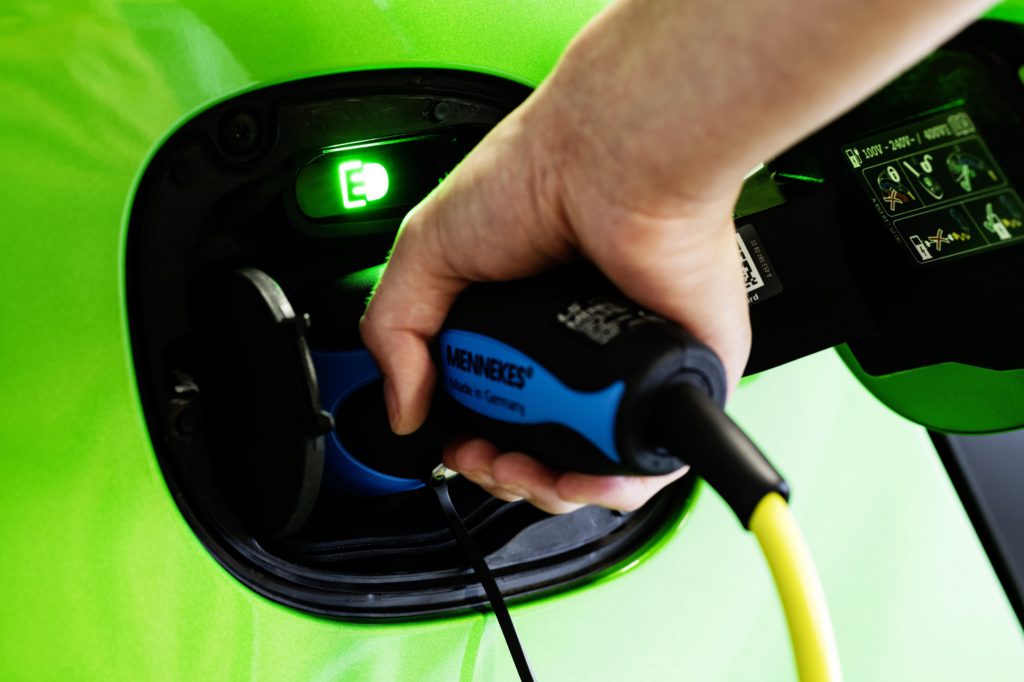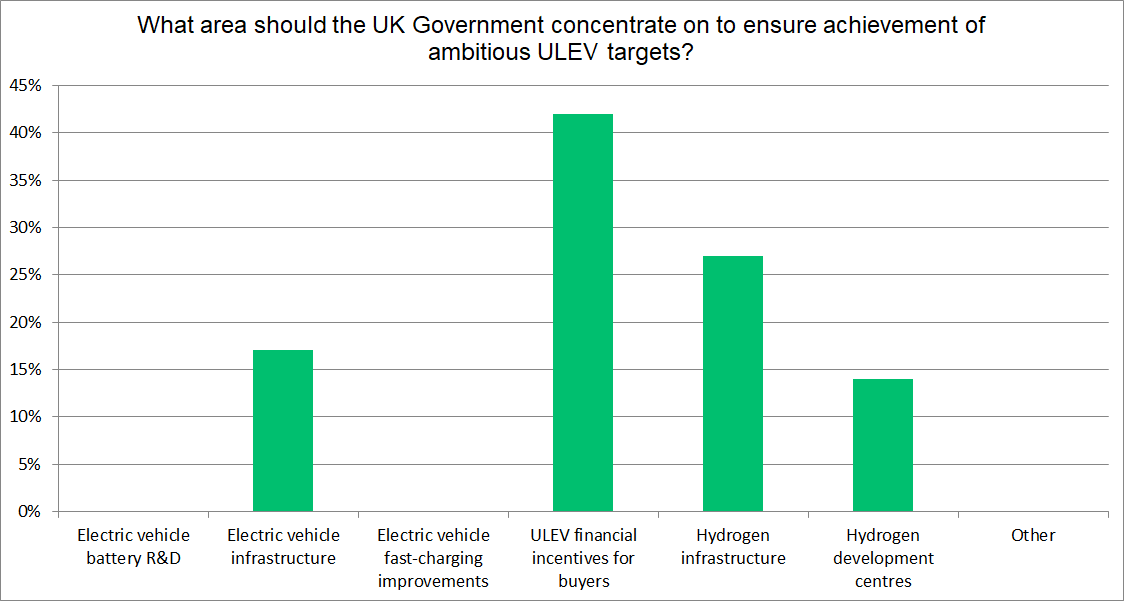Financial incentives crucial for the UK to meet ULEV targets
25 October 2019

25 October 2019
The UK Government needs to concentrate on financial incentives in order to boost the uptake of low and zero-emission vehicles.
With ambitious ultra-low emission vehicle (ULEV) targets, and plans to ban sales of conventional-engine vehicles by 2040, registrations of battery-electric vehicles (BEVs) and plug-in hybrids (PHEVs) only make up a small percentage of the UK market. While sales are increasing impressively, they are doing so based on small figures.
To increase sales further, financial incentives should be improved on ULEVs, according to 42% of respondents in the latest Autovista Group poll.
 Last year, the UK Government introduced a new incentive package. BEVs now qualify for a £3,500 (€3,985) subsidy. Prior to that, grants had ranged from £2,500 to £4,500 (€2,847 to €5,124), depending on the distance a vehicle could travel on electric power only.
PHEV falls
This latest incentive package removed financial bonuses for PHEVs, a move that has led to sales of the technology in the UK crashing. Sales figures for July, the last month not to be skewed by WLTP implementation in 2018, revealed that PHEV registrations were down nearly 50% year-on-year, dropping from 3,503 units to 1,764. BEV registrations were up 158.1% but this still only represents a move from 880 to 2,721 sales.
Therefore, to improve the sale of ULEVs, more should be done to boost incentives across all models, helping to introduce the technology ahead of the 2040 ban, while carmakers improve the number of models available.
Location benefits
Hydrogen allows similar refuelling times to petrol and diesel but as the technology is less advanced, there is an even smaller infrastructure dedicated to this technology than electric-vehicle charging. Yet with many believing hydrogen is the future of ULEVs, investment in this area could become crucial in the years to come.
The opportunity hydrogen offers is reflected in the results, with 27% of voters believing that the UK needs to invest in this area – allowing carmakers that already have vehicles on the market using the technology to improve their sales. Europe is calling for improvements in hydrogen infrastructure as a matter of urgency.
EV infrastructure was next with 17%. This is a big public concern and, for many, the lack of a charging station or inadequate facilities for BEVs close to home is putting them off converting to the technology. Range anxiety is still an issue, with drivers used to long distances and fuel stops. While BEV ranges are improving, the charging times and gaps between stations is rendering these advances almost inadequate.
The technology behind the charging infrastructure also needs investigating. As some voters highlighted in the comments, wireless charging is required to make it even easier for BEV drivers to recharge their vehicle. This would also lessen the potential impact of ′street clutter’ and help those living in blocks of flats.
Hydrogen wins
Finally, 14% of voters felt that the UK could lead the way with hydrogen deployment and development and should, therefore, concentrate its efforts on development centres for the fuel. With most European economies putting their backing behind BEV technology, and the benefits of hydrogen becoming clearer, such a move could give the UK a lead in the technology and therefore allow it to meet its ULEV goals.
Last year, the UK Government introduced a new incentive package. BEVs now qualify for a £3,500 (€3,985) subsidy. Prior to that, grants had ranged from £2,500 to £4,500 (€2,847 to €5,124), depending on the distance a vehicle could travel on electric power only.
PHEV falls
This latest incentive package removed financial bonuses for PHEVs, a move that has led to sales of the technology in the UK crashing. Sales figures for July, the last month not to be skewed by WLTP implementation in 2018, revealed that PHEV registrations were down nearly 50% year-on-year, dropping from 3,503 units to 1,764. BEV registrations were up 158.1% but this still only represents a move from 880 to 2,721 sales.
Therefore, to improve the sale of ULEVs, more should be done to boost incentives across all models, helping to introduce the technology ahead of the 2040 ban, while carmakers improve the number of models available.
Location benefits
Hydrogen allows similar refuelling times to petrol and diesel but as the technology is less advanced, there is an even smaller infrastructure dedicated to this technology than electric-vehicle charging. Yet with many believing hydrogen is the future of ULEVs, investment in this area could become crucial in the years to come.
The opportunity hydrogen offers is reflected in the results, with 27% of voters believing that the UK needs to invest in this area – allowing carmakers that already have vehicles on the market using the technology to improve their sales. Europe is calling for improvements in hydrogen infrastructure as a matter of urgency.
EV infrastructure was next with 17%. This is a big public concern and, for many, the lack of a charging station or inadequate facilities for BEVs close to home is putting them off converting to the technology. Range anxiety is still an issue, with drivers used to long distances and fuel stops. While BEV ranges are improving, the charging times and gaps between stations is rendering these advances almost inadequate.
The technology behind the charging infrastructure also needs investigating. As some voters highlighted in the comments, wireless charging is required to make it even easier for BEV drivers to recharge their vehicle. This would also lessen the potential impact of ′street clutter’ and help those living in blocks of flats.
Hydrogen wins
Finally, 14% of voters felt that the UK could lead the way with hydrogen deployment and development and should, therefore, concentrate its efforts on development centres for the fuel. With most European economies putting their backing behind BEV technology, and the benefits of hydrogen becoming clearer, such a move could give the UK a lead in the technology and therefore allow it to meet its ULEV goals.
 Last year, the UK Government introduced a new incentive package. BEVs now qualify for a £3,500 (€3,985) subsidy. Prior to that, grants had ranged from £2,500 to £4,500 (€2,847 to €5,124), depending on the distance a vehicle could travel on electric power only.
PHEV falls
This latest incentive package removed financial bonuses for PHEVs, a move that has led to sales of the technology in the UK crashing. Sales figures for July, the last month not to be skewed by WLTP implementation in 2018, revealed that PHEV registrations were down nearly 50% year-on-year, dropping from 3,503 units to 1,764. BEV registrations were up 158.1% but this still only represents a move from 880 to 2,721 sales.
Therefore, to improve the sale of ULEVs, more should be done to boost incentives across all models, helping to introduce the technology ahead of the 2040 ban, while carmakers improve the number of models available.
Location benefits
Hydrogen allows similar refuelling times to petrol and diesel but as the technology is less advanced, there is an even smaller infrastructure dedicated to this technology than electric-vehicle charging. Yet with many believing hydrogen is the future of ULEVs, investment in this area could become crucial in the years to come.
The opportunity hydrogen offers is reflected in the results, with 27% of voters believing that the UK needs to invest in this area – allowing carmakers that already have vehicles on the market using the technology to improve their sales. Europe is calling for improvements in hydrogen infrastructure as a matter of urgency.
EV infrastructure was next with 17%. This is a big public concern and, for many, the lack of a charging station or inadequate facilities for BEVs close to home is putting them off converting to the technology. Range anxiety is still an issue, with drivers used to long distances and fuel stops. While BEV ranges are improving, the charging times and gaps between stations is rendering these advances almost inadequate.
The technology behind the charging infrastructure also needs investigating. As some voters highlighted in the comments, wireless charging is required to make it even easier for BEV drivers to recharge their vehicle. This would also lessen the potential impact of ′street clutter’ and help those living in blocks of flats.
Hydrogen wins
Finally, 14% of voters felt that the UK could lead the way with hydrogen deployment and development and should, therefore, concentrate its efforts on development centres for the fuel. With most European economies putting their backing behind BEV technology, and the benefits of hydrogen becoming clearer, such a move could give the UK a lead in the technology and therefore allow it to meet its ULEV goals.
Last year, the UK Government introduced a new incentive package. BEVs now qualify for a £3,500 (€3,985) subsidy. Prior to that, grants had ranged from £2,500 to £4,500 (€2,847 to €5,124), depending on the distance a vehicle could travel on electric power only.
PHEV falls
This latest incentive package removed financial bonuses for PHEVs, a move that has led to sales of the technology in the UK crashing. Sales figures for July, the last month not to be skewed by WLTP implementation in 2018, revealed that PHEV registrations were down nearly 50% year-on-year, dropping from 3,503 units to 1,764. BEV registrations were up 158.1% but this still only represents a move from 880 to 2,721 sales.
Therefore, to improve the sale of ULEVs, more should be done to boost incentives across all models, helping to introduce the technology ahead of the 2040 ban, while carmakers improve the number of models available.
Location benefits
Hydrogen allows similar refuelling times to petrol and diesel but as the technology is less advanced, there is an even smaller infrastructure dedicated to this technology than electric-vehicle charging. Yet with many believing hydrogen is the future of ULEVs, investment in this area could become crucial in the years to come.
The opportunity hydrogen offers is reflected in the results, with 27% of voters believing that the UK needs to invest in this area – allowing carmakers that already have vehicles on the market using the technology to improve their sales. Europe is calling for improvements in hydrogen infrastructure as a matter of urgency.
EV infrastructure was next with 17%. This is a big public concern and, for many, the lack of a charging station or inadequate facilities for BEVs close to home is putting them off converting to the technology. Range anxiety is still an issue, with drivers used to long distances and fuel stops. While BEV ranges are improving, the charging times and gaps between stations is rendering these advances almost inadequate.
The technology behind the charging infrastructure also needs investigating. As some voters highlighted in the comments, wireless charging is required to make it even easier for BEV drivers to recharge their vehicle. This would also lessen the potential impact of ′street clutter’ and help those living in blocks of flats.
Hydrogen wins
Finally, 14% of voters felt that the UK could lead the way with hydrogen deployment and development and should, therefore, concentrate its efforts on development centres for the fuel. With most European economies putting their backing behind BEV technology, and the benefits of hydrogen becoming clearer, such a move could give the UK a lead in the technology and therefore allow it to meet its ULEV goals.